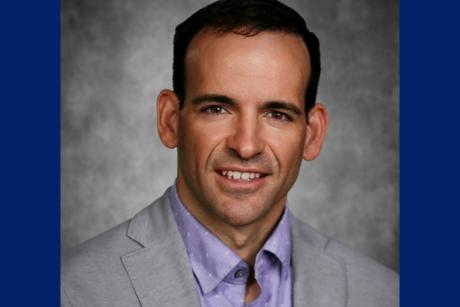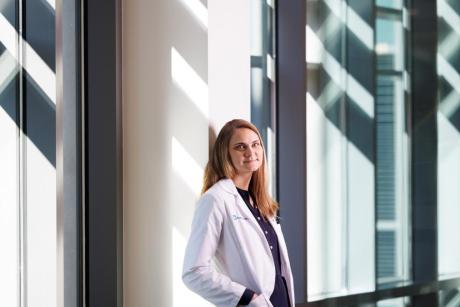
Mina Silberberg, center, with El Centro Hispano, Inc.'s Rubi Morales and Pillar Rocha-Goldberg [Photo credit: Duke Communications and Marketing]
Published March 18, 2025, last updated on March 19, 2025 under Education News
When Mina Silberberg, Ph.D., was asked to join a search committee to hire a faculty director for Duke’s new Center for Community Engagement, she saw something in the role that she wasn’t expecting: herself.
Launched in February, the center will facilitate research collaborations between Duke and community partners in and around Durham. Silberberg, a professor of family medicine and community health who has a joint appointment with the Duke Global Health Institute, understood the importance of that mission, having led community-engaged research for more than two decades. So she declined the invitation to the search committee and applied for the faculty director position, which she accepted this past fall.
“Duke is a part of Durham, and it has a significant role to play in the economic and social atmosphere of the city,” says Silberberg, who led the Community-Engaged Research Initiative for the Duke Clinical Research Institute.. “It’s important to make that work for good and leverage it the best way we can as citizens in the community.”
A big part of Silberberg’s role as faculty director will be to connect Duke professors, staff and students with community partners to collaborate on research projects, which she says can both help address pressing issues in the community and provide transformative learning experiences.
“I do believe doing your work in a community-engaged way is enlightening,” she says. “It gives you a different understanding to really see it from the point-of-view of people who are living the reality.”
Silberberg spoke with DGHI about her experiences with community-engaged research, her global health work, and her goals for the center.
It’s been a little more than a month since the center’s official launch. How does it feel?
I’m more excited than I was before as the launch event brought out a wonderful cross-section of the Duke and Durham communities. The day before the launch, it was announced that I’ll be leading the center with Debbie Goldstein. She brings a wealth of experience to this role as the associate vice-president and associate vice-provost for Community Engaged Scholarship.
Can you tell us about any current projects that highlight the center’s focus?
We’re currently accepting applications for this summer's community-engaged doctoral fellowship program. Through this program, Duke doctoral students are funded to work with community organizations. Also, we are continuing the Foundations of Engagement and identifying opportunities to bring it to a broader audience and how to pair it with other campus initiatives.
How do you see the center enhancing experiences for DGHI students, and particularly for the large number of international students that come to Durham as part of the Master of Science in Global Health program?
I think it will give more opportunities to find meaningful research and educational experiences that don’t require them to leave the country.
In my experience, students are excited to get off campus to learn about Durham, its history and health needs while connecting with folks in the community. Community-engaged research motivates you and hopefully, your research has a greater impact. We have this amazing community right here with a diverse population, incredible history of activism, and so many people to learn from and collaborate with.
How did you become interested in global health?
I grew up in the suburbs of California, and my dad worked for IBM. Our family was transferred to Japan, and we traveled across South and Southeast Asia. It was a striking experience to see what I saw in countries such as Thailand. We went to a village where it was extremely impoverished and to the prince’s summer palace. It made me think about, “How do we have both of these things – extreme poverty and extreme wealth?” This was in the 1970s. That brought my attention to inequality and inequity, and trying to understand why this happens.
What’s a project you were involved in that shows the importance of community-level research?
A few years ago, I was part of the Robert Wood Johnson Foundation's (RWJF) Interdisciplinary Research Leaders program, and our team wanted to address issues surrounding housing and health. Medicaid was looking to expand its case management to [assist] with housing, help people stay in it and not become homeless. They understood housing is a driver of health and wanted to improve upon that, especially after disaster events. The gratifying aspect is what came out of the study.
We connected with a team in Louisiana after Hurricane Florence hit North Carolina about how to handle housing displacement. That helped create a program called Back at Home, a program that uses a cost-effective rapid rehousing model still being used today. This wasn’t how the research started, but this is the relationship that came out of it.
What are the goals for the center in the coming years?
We aim to expand and improve the quality of community engaged scholarship by working in three domains: preparation/training for collaboration; navigation, networking and cultivation of partnerships; and systems, policy, and curricular changes that facilitate effective engagement.


